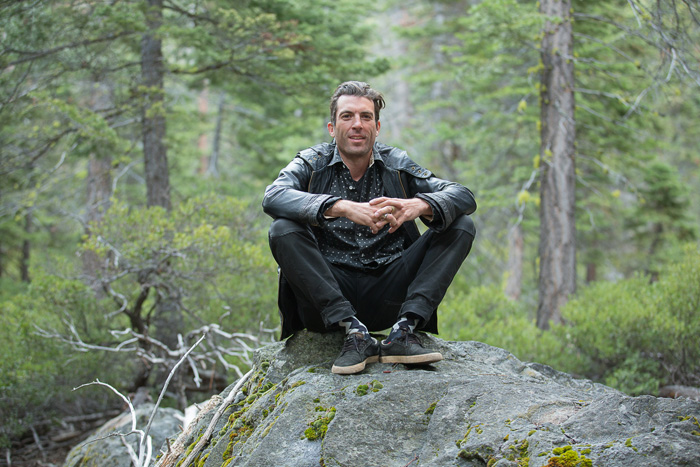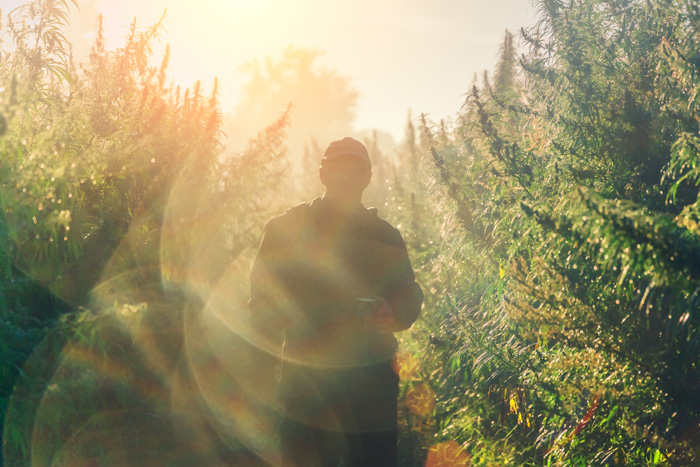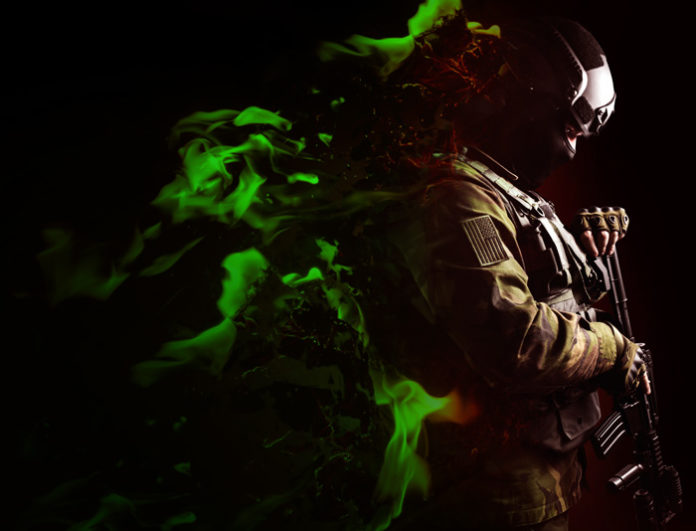In late November 2017, just as Brian Chaplin was scooping up the last bits of an apple tart in a downtown Nevada City, California, restaurant, he received a text message from an employee at the Medicine Box farm in Grass Valley: “We’ve just been fu@#-ing robbed!”
Chaplin recalls freezing for thirty to forty seconds as a flurry of questions raced through his head. Who would do this? Is everyone okay? What does this mean for my business? My home? Should I call 911; go the legal route and risk whatever comes with that? Or should I stay silent, take the hit, play it safe?
He decided to make the call. And down the rabbit hole he went.
Onset of symptoms
The day started with a hot, dry Indian Summer morning that gave way to a cool, breezy evening. Chaplin spent the day harvesting on Medicine Box’s farm and was tired but excited by his bounty. To recharge and relax, he and his partner stepped out on the town.
Little did he know a cops-and-robbers thriller was playing out back on the ranch: A group of men in full tactical gear, carrying AR15s and masquerading as a task force, had broken into one of Medicine Box’s 2,500-square-foot greenhouses and stolen the entire harvest, almost 100 pounds, plus $10,000-worth of equipment. After blindfolding and tying up the employees, at one point planting a mud-smeared boot on the face of a trimmer, they disappeared into the night.
A short time later, while the employees were still blindfolded, a sheriff’s narcotics team arrived brandishing a search warrant. The officers weren’t there to dust for fingerprints, ask for video camera footage, or question witnesses. They had come to confiscate the remaining harvest. When Chaplin informed the cops Medicine Box was part of legal collective Caladrius Network, even producing paperwork, they ignored him.
Not ready to deal with the kicked-in doors, busted windows, and debris, he spent the next morning raking leaves, watering, and chasing chickens. He didn’t feel sorry for himself or think about quitting, but he did feel violated. “I was growing legally through a collective,” Chaplin said. “I had all the paperwork; was totally legit. None of that seemed to matter to [the officers]. I don’t think they cared about me.”
Earlier in the week Chaplin had attended his usual community advisory group meeting. The who’s who at the meetings is like straight out of central casting: old-time business and homestead owners, sunburned cannabis cultivators, suffering patients standing up for their medicine, advocates, police, media, and a few mean-looking prohibitionists. He’d been attending for more than a year but had never spoken. Acting on an urge to extend an olive branch and clear the air between the factions after several run-ins between law enforcement and cultivators, he rose and spoke at the end of the meeting.
“My name is Brian Chaplin,” he recalls saying. “I’m a property owner, cultivator, taxpayer, community member, and alliance board member. We [cultivators] are seeking a path forward and want all of us to work together and educate one another.”
He received a smattering of applause, but mostly the proverbial stink eye. Thirty-six hours later, a sheriff’s deputy arrived at Medicine Box’s front gate. The deputy informed Chaplin he was responding to neighbors’ complaints about a bad smell coming from the property. Chaplin was perplexed. He knew all his neighbors, and it seemed unlikely they would complain about cannabis odors. Plus, he had all the legal collective paperwork. Then, he recognized the deputy as one of a handful of anti-cannabis crusaders who reportedly had been giving cultivators a hard time. After chatting for a few minutes, the deputy said he’d send a patrol back on Monday morning to take a full report.

Diagnosis
The more Chaplin reflected on the peculiar timing of the events, the more troubled he became. On Tuesday, he gave a speech at the local meeting. Thirty-six hours later, a sheriff’s officer arrived at his gate. A day and a half later, gun-wielding, masked, boot-stomping thugs robbed Medicine Box, and fewer than two days after that, additional deputies.
Something unsavory was afoot, he decided, and he needed to secure the part of the harvest the robbers had overlooked.
He called in the crew on Saturday and all of them worked tirelessly, like a team of ants, to move the second harvest to a secret location. Then, after a Monday morning meditation, he drove to meet the sheriff at Medicine Box’s gate. The sheriff didn’t show.
During the first few weeks following the raid, Chaplin kept a strict schedule: Wake at dawn, meditate, and play his guitar before vanishing into the endless trails that snake through Grass Valley’s quartz- and pine-filled canyons. He surrounded himself with friends and family, always mindful that he needed to keep moving forward “one stone to the next.” Most importantly, he said, he realized that to be a true advocate and warrior for the plant, he needed to tell his story.
Shortly after the raid, Chaplin took a risk and agreed to an interview with Rolling Stone, possibly the most high-profile, pro-cannabis publication in mainstream media. Although the article was not lengthy, Chaplin felt he’d planted a seed. The organizers of a 4/20 cannabis retreat invited him to be a special guest. All the while, he was spending an inordinate amount of time and money speaking with his attorney about, among other things, suing the county for property damage and recovery of lost income.
At times when the unavoidable weight of the process threatened to smother him, he’d drive to the misty forests of Mendocino County and visit his mentor, a 72-year-old registered nurse and former craniosacral therapist turned plant-medicine man and cannabis breeder. On one visit, the mentor presented Chaplin with a gift: samples of an unprecedented 34:1 high-CBD strain and encouragement to develop products that would “shake up the industry.”
In addition, Chaplin’s mentor offered advice: “It’s time to get back to your brand.”
Patient history
Chaplin has the amiable affect and quiet intensity of a spiritual guide or advisor: direct eye contact and slow, measured sentences punctuated with experiential anecdotes delivered with a quiet, everything-will-be-all-right vibe. He sees himself as an activist, advocate, patient, farmer, and businessman. To live the full potential of his self-concept, though, Chaplin determined he could not surrender to pity and victimhood. “What’s the point, right?” he said.
Chaplin grew up in the bucolic, woodsy wonderland of the Lakes Region of New Hampshire (“Live Free or Die”). He often accompanied his father, a housepainter, to work. On weekends, he set up a veggie stand and sold the produce his mother grew in their backyard. At night, his dad read him the Lord of the Rings books, stirring his imagination for adventure, nature, and being part of “the light.”
Although he was diagnosed with attention deficit disorder, his mother declined to give him medication. As a teenager, Chaplin turned to self-medicating with booze and cocaine. By the time he reached adulthood, he’d developed a daily routine: beer during the day, wine for dinner, a few snorts, then tequila, whiskey, port, or whatever other intoxicating beverage was available. As for cannabis, maybe only a few hits from a joint at parties. (Sober since September 2012, he now uses only Medicine Box’s Equanimity, a 300mg THC blend with organic herbs, to treat his ADD and occasional anxiety.)
It wasn’t until 2009, when some friends took him to a warehouse space in Oakland and proposed they begin cultivating weed, that Chaplin discovered the medicinal alchemy of cannabis. Over time, he learned he had a talent for growing and making money…and, like the hobbits in the Tolkien books of his youth, a mission to bring light—medicine—to the afflicted.
“I realized I liked farming and wanted to learn more,” he said. “I was hooked. I wanted to grow big plants; bring superior medicine to the market through a trusted brand.”
In 2016, Chaplin cashed out his savings and founded Medicine Box.
The company’s first product was the Equanimity tincture. Made with Chaplin’s homegrown, CO2-extracted Gold Country indica Afgoo oil, fractionated coconut oil, and herbs like valerian root, licorice, damiana, skullcap, chamomile, oat straw, and hawthorn berry, the tincture addressed sleep, serenity, focus, and relaxation. The first sample convinced Chaplin the combination was a winner. Other tinctures followed, targeting digestion, inflammation, allergies, and menstrual cycle pain relief. His partner, “the smartest and toughest person I know,” suggested edibles with a twist: square, gluten-free truffles doused with coconut and Afgoo oil, crafted with limited sweeteners in uncommon flavor combinations like caramelized strawberry, coconut goji berry, lemon blueberry, mint espresso, and peanut butter banana. The medicine bars became the company’s answer to what the pair considered saccharine treats flooding dispensary shelves. “They are fun to add as bites on salads, soups, and yogurt,” Chaplin said.
Dispensary owners in San Francisco and Los Angeles took notice of the unique herb blends in Medicine Box’s tinctures and edibles, as well as the company’s smart, modern packaging. Patients appreciated Equanimity’s consistent and serene effects and taste. “After meeting with retail buyers and hearing the customer feedback, I made a strategic decision to lead with [Equanimity] as our signature product,” Chaplin said.
 Treatment plan
Treatment plan
For Chaplin, the most difficult consequence of the raid is that 80 percent of the flower seized was biomass destined for extraction into oil for infusion. With adult-use retail looming, at the time of the November raid he had a very short period to comply with California regulators’ order that existing stock be inventoried by manufacturers and distributors before January 1. Selling the products he no longer could make because the raw materials had been seized had been essential to Medicine Box’s survival. “We had a solid two months for this very important move,” said Chaplin, “but plans fell apart when the seizure happened.”
As it turned out, plans were just beginning. With an eye to the future and concern for the workers who depended upon his company, Chaplin continued to pay his employees while Medicine Box languished in limbo. He also launched Operation Save the Brand. The first order of business: Enter the “yes vortex.”
“Basically, I just said yes to everything: lunches, investor meetings, engagements, even marrying two of my friends,” Chaplin said. “I’ve also been best man for four grooms.” He paused, “Not sure what that has to do with [Operation Save the Brand], but…”
Chaplin spent the morning of 4/20 multitasking in his hotel room in Malibu, California. Between phone calls with his website designer in Italy and his programmer in Brazil, he filled Equanimity tinctures to sell later that day. He’d been invited to emcee a panel discussion at Cannabliss Retreats’ four-day 4/20 event and knew the appearance could be an important step in Medicine Box’s re-emergence, so he wanted to make sure the website, messaging, and products were aligned.
Seated in a garden filled with cannabis travelers, professionals, insiders, and acolytes, Chaplin felt right at home on the panel, especially when the discussion became emotional. Holding back tears, a British celebrity shared how cannabis has ameliorated her lifelong seizures. A former National Football League lineman spoke about cannabis lifting his depression and myriad aches and pains. Chaplin shared intimate details, too.
The next morning, he met with buyers at a clutch of Southern California dispensaries. After listening to Chaplin explain the particulars of Equanimity and a bit about the Medicine Box brand, the buyer for Malibu Community Directive inquired, “What’s your minimum order?” Without hesitation, Chaplin answered, “Whatever you want. I am more about creating positive relationships and getting the products to patients.”
He envisions Medicine Box fundamentally changing people’s lives by helping them heal and stay spiritually grounded. Although he is firmly convinced Equanimity works and could be a game-changer, he’s in no particular rush to impose that notion on the rest of the world. Nor is he in a rush to accept outside capital. For the past two years he’s heard the same question from potential investors: “How fast can you scale?” He’d rather they ask, “How fast can we collaborate to help people heal?” When the synergy is right, someone will, he said.
“I get approached all the time by investors,” he revealed. “A few weeks ago two guys wanted to throw millions at the company, but it smelled like a pump-and-dump scheme riddled with shell company after shell company.”
Recovery and rehabilitation
A few days after Chaplin returned to Grass Valley, he experienced an epiphany about the raid. “The biggest thing I learned was that what we do in the face of adversity can be our most powerful skill,” he said. “I finally gave myself a pat on the back for being able to possess the ‘equanimity’ needed to keep moving forward, no matter what.”
He also realized losing the harvest—and almost his business—made him a more mindful grower and boss. “You get real creative when you are running on financial fumes,” he said with a smile.
In the broader world much work remains to be done, he said. As his experience indicated with frightening clarity, the plant still isn’t widely accepted, even in California. He hopes “the Medicine Box incident” will encourage more education, adaptability, perseverance, and persuasion.
The journey hasn’t been easy, but Chaplin said the shock of the raid is receding and he is happy to be part of a working cannabis farm again, raking, planting, watering, and getting dirty. “Navigating the wreckage after the raid, while simultaneously building a company and dealing with all the new regulations with a scarce budget, was like going to battle without armor,” he said.
Instead of letting lingering trauma rule him, though, he is using the raid as inspiration to make Medicine Box bigger and better. Also inspirational? His mother’s assessment after the raid. “Honey, ever since you were a little kid, anything you put your mind to you figured out and accomplished,” she told him. “You’ll come back stronger.”








